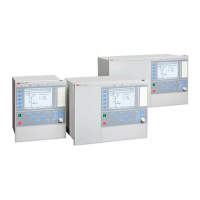A070882 V4 EN
Figure 245: Functional module diagram
Timer
The duration of the TRIP output signal from TRPPTRC can be adjusted with the Trip
pulse time setting when the "Non-latched" operation mode is used. The pulse length
should be long enough to secure the opening of the breaker. For three-pole tripping,
TRPPTRC has a single input OPERATE, through which all trip output signals are
routed from the protection functions within the protection relay, or from external
protection functions via one or more of the protection relay's binary inputs. The
function has a single trip output TRIP for connecting the function to one or more of
the protection relay's binary outputs, and also to other functions within the protection
relay requiring this signal.
The BLOCK input blocks the TRIP output and resets the timer.
Lockout logic
TRPPTRC is provided with possibilities to activate a lockout. When activated, the
lockout can be manually reset after checking the primary fault by activating the
RST_LKOUT input or from the LHMI clear menu parameter. When using the
"Latched" mode, the resetting of the TRIP output can be done similarly as when using
the "Lockout" mode. It is also possible to reset the "Latched" mode remotely through
a separate communication parameter.
The minimum pulse trip function is not active when using the
"Lockout" or "Latched" modes but only when the "Non-latched"
mode is selected.
The CL_LKOUT and TRIP outputs can be blocked with the BLOCK input.
Table 506: Operation modes for the TRPPTRC trip output
Mode
Operation
Non-latched The
Trip pulse length
parameter gives the
minimum pulse length for TRIP
Latched TRIP is latched ; both local and remote clearing is
possible.
Lockout TRIP is locked and can be cleared only locally via
menu or the RST_LKOUT input.
1MRS758755 A Section 5
Protection related functions
REC615 and RER615 477
Technical Manual

